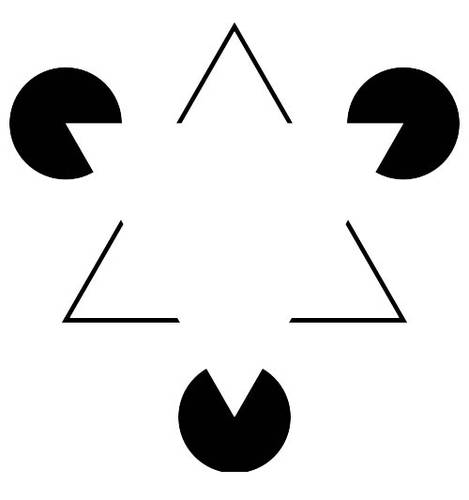“DO NOT BELIEVE EVERYTHING YOU THINK.”
Now, that advice may sound over-simplified and silly, but there is some serious truth behind those words. After watching what I would consider to be one of the most powerful TED talks out there, I learned that maybe it’s not our brain we should be relying on for accurate portrayals of ourselves and others…maybe it’s our heart.
.
Let’s take a look at Kanizsa’s Triangle. What do you see when you look at this image? Is one triangle larger than the other? What about the circles in the image?

Well, there actually aren’t any triangles or circles in the picture above- your brain simply completes the shapes and delivers those images we instantly recognize as ‘triangles’ and ‘circles.’ It is basic pattern recognition, and our brain uses this tool to help us in our everyday lives.
But have you ever tried to ‘unsee’ something once you’ve seen it? It’s almost impossible. And it can have unfortunate effects on how we see ourselves, and others.
What about our memory? Surely our memory gives us an accurate depiction of our lives. I mean, we were there. We remember what we did, who we were with, and where we went. Or do we?
Breisch references a study about flashbulb memory,in which psychologists questioned people immediately after the Challenger explosion in 1986. They asked participants to write down, in their own words, what happened, who they were with, and the sequence of events that transpired. They found the same people 3 years later and asked them the same questions, with some fascinating results. Only 7% got them right. 50% of people incorrectly remembered 2/3 of their assertions, and 25% were way off in left field and got none of them correct.
SO IF WE CAN’T TRUST WHAT WE SEE, AND WE CAN’T TRUST WHAT WE REMEMBER, HOW DO WE KNOW WHO WE ARE, OR WHAT WE’RE WORTH? OR IF WE ARE WORTH ANYTHING AT ALL?
Breisch gives us a brief glimpse at the answer that took him through a heartfelt, soul-searching journey of discovery.
“I frequently find myself betwixt and between logical thought and deep emotion; caught somewhere in the fissure between my cerebral cortex and my heart. We live in an era that would have us believe the logical and rational are the singular keys to success. We practically abhor emotions. When they arrive, often unbidden, we are encouraged not to feel.”
“John Keats once said ‘the heart is the only organ strong enough to educate the mind.’ A number of years ago, when improvisational pianist Michael Jones reminded me of Keats’ wisdom, he added, ‘When we are thinking from our heart we are never far from tears.’
“The word courage and the word heart both derive from the Latin word cor. It takes courage to allow the heart to educate the mind. Perhaps someday we will, collectively, become more comfortable thinking from our hearts…and honor those who are never far from tears.”
By Raven Fon
Originally appeared on UniSoulTheory


Leave a Reply